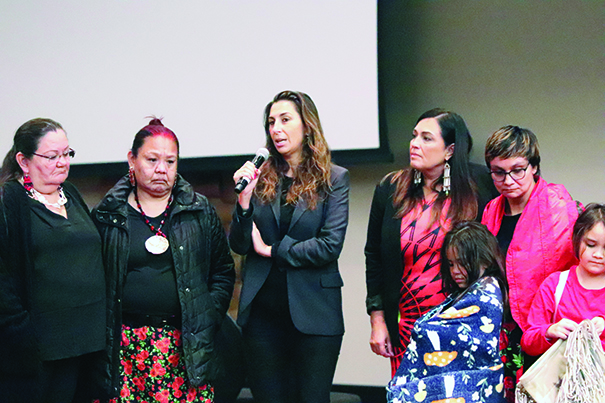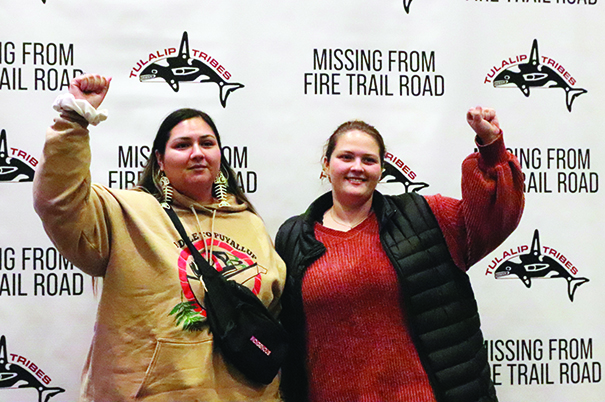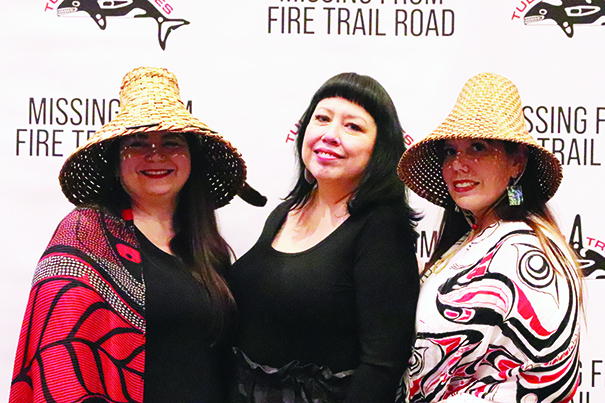“We want to bring Mary home“

By Wade Sheldon, Tulalip News
On Sunday, November 10, the Tulalip Tribes hosted the heartfelt Missing from Fire Trail Road premiere, directed by Sabrina Van Tassel. The film has garnered international recognition for its sensitive portrayal of the ongoing case of Mary Ellen Johnson-Davis, a Tulalip Tribes member missing since November 2020. The event brought together the Tulalip and surrounding communities, united in support of Johnson-Davis and the broader issue of missing and murdered Indigenous women (MMIW).

As Native culture continues to gain recognition, the film highlights the urgent need to address the tragic issues affecting Indigenous communities and work toward healing. Van Tassel’s documentary delves into the deep-rooted causes behind the MMIW epidemic, examining the challenges Indigenous communities face in securing justice and support. It shines a light on the systemic issues that lead to insufficient investigation of crimes on reservations, such as jurisdictional gaps, lack of resources, and historical trauma that exacerbate Indigenous women’s vulnerability.
Deborah Parker, a respected tribal leader and advocate for Native American rights at both state and national levels, serves as the documentary’s primary interviewer, and co-producer. Her partnership with Van Tassel aims to amplify Indigenous voices and further the search for Mary Ellen. “Our hope is, one, to find our path to Mary, and two, to honor her and her life,” Parker said at the premiere.

During the Women’s Warrior Song, she led the audience in raising their hands in solidarity with Johnson-Davis’s family, marking a decisive moment of unity. After the film, Parker expressed, “As emotional as this film is, it’s also healing.”
The documentary also highlights the barriers Indigenous communities face in the legal system, including the limitations tribes face in prosecuting non-Native offenders on reservations. Van Tassel hopes to increase awareness of these injustices, explaining, “It was my goal to give [Mary Ellen] an identity.” The film advocates for enhanced tribal authority to pursue justice for crimes committed within Indigenous communities, as current jurisdictional limitations often allow non-native offenders to escape prosecution by leaving the reservation.
Carmelita Escarsega, an anti-human trafficking advocate with the Puyallup Tribes, attended the premiere and shared her perspective on the film’s impact. Her friend, and anti-human trafficking manager, Carolyn DeFord, has personally been affected by the MMIW crisis—her mother has been missing for 25 years. “This is a powerful story to get out to the public and the world and let them know what is going on and what is not,” Escarsega said. She reflected on law enforcement’s response in the documentary, “The FBI looked like he was squirming in his seat with what he was saying. I’m grateful that they did this.”

When asked how well the film represents the Indigenous community, Escarsega emphasized its impact: “It’s powerful. It shows that we are underrepresented in the media and that we are just as human as everybody else, and we deserve to be heard, seen and believed. When we say something is wrong, something is wrong. To let people get away with coming jurisdictionally onto our reservations and taking and stealing our women and our children and our people is wrong.”
This call for accountability resonates with Tulalip Chief of Police Shawn Ledford, who emphasized the importance of community support in solving Mary Ellen’s case. “If you know something or have an idea, come forward and give us a call. We want to bring Mary home,” he urged, adding, “What we do need is additional leads.”

Missing from Fire Trail Road is available to stream on Amazon and Apple TV, allowing audiences across the U.S. to engage with this important story and support the search for Mary Ellen Johnson-Davis.
Mary Ellen Johnson-Davis is still missing. If you or anyone you know has information or tips regarding her whereabouts, please call the Tulalip Police Department tip line at (360) 716-5990 or contact the FBI online at tips.fbi.gov.